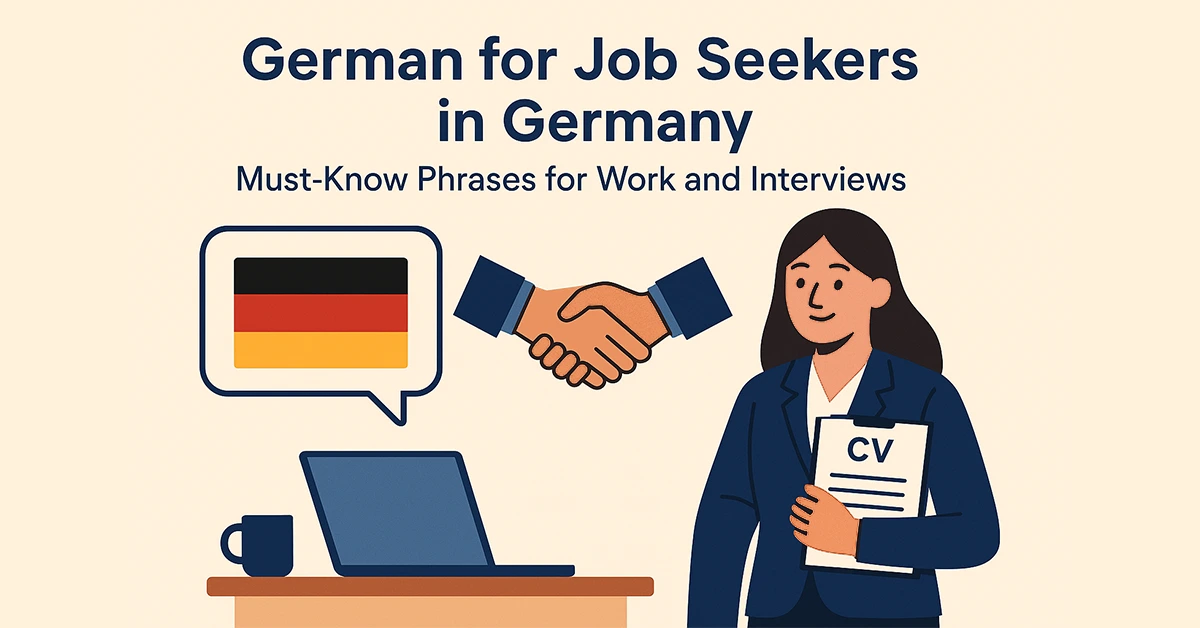German for Job Seekers – Phrases for Work and Interviews

Learning German is crucial if you want to find a job in Germany. Most employers expect at least basic communication skills. By mastering German for Job Seekers, you’ll increase your chances of being hired.
Why Learning German Is Essential for Job Seekers in Germany
Learning German is crucial if you want to find a job in Germany. Most employers expect at least basic communication skills. By mastering German for Job Seekers, you’ll increase your chances of being hired.
Ich suche eine Arbeitsstelle. [ɪç ˈzuːxə ˈaʁbaɪtsʃtɛlə] – I am looking for a job.
How Much German Do You Need for Different Job Sectors?
Here’s a quick overview:
- Healthcare & Teaching: B2–C1 level required
- Hospitality & Retail: A2–B1 usually sufficient
- IT & Engineering: B1 is useful; English might suffice in some roles
Assess your target industry and start learning the appropriate level of German for job seekers.
Must-Know German Phrases for Job Interviews – With English Translations
| German | English |
|---|---|
| Erzählen Sie mir etwas über sich. [ɛɐ̯ˈtsɛːlən zi miɐ̯ ˈɛtvɐs ˈyːbɐ ˈzɪç] | Tell me about yourself. |
| Warum möchten Sie bei uns arbeiten? | Why do you want to work with us? |
| Was sind Ihre Stärken und Schwächen? | What are your strengths and weaknesses? |
Important German Vocabulary for CVs, Resumes, and Job Applications
- Lebenslauf – Resume / CV
- Anschreiben – Cover letter
- Berufserfahrung – Work experience
- Kenntnisse – Knowledge / Skills
Phrases to Describe Your Work Experience and Skills in German
Ich habe drei Jahre als Softwareentwickler gearbeitet. [ɪç ˈhaːbə dʁaɪ ˈjaːʀə ʔals ˈzɔftvaːɐ̯ʔɛnˈtɪflɐ̯ ɡɐʁˈbaɪtət] – I worked as a software developer for three years.
Ich habe Erfahrung im Projektmanagement. – I have experience in project management.
Useful German Questions to Ask in Job Interviews
- Wie sieht ein typischer Arbeitstag aus? – What does a typical workday look like?
- Gibt es Weiterbildungsmöglichkeiten? – Are there training opportunities?
How to Answer Common German Interview Questions
Be direct and structured. Use STAR (Situation, Task, Action, Result) method to frame answers. Practice speaking confidently.
German Phrases for Talking About Strengths and Weaknesses
- Stärken: teamfähig, verantwortungsbewusst, zuverlässig
- Schwächen: ungeduldig, manchmal perfektionistisch
How to Speak Formally and Politely in a German Work Context
Always use Sie in professional contexts. Use titles like Herr and Frau with last names.
Darf ich Sie etwas fragen? – May I ask you something?
German Vocabulary for Emails and Professional Work Communication
- Sehr geehrte Damen und Herren – Dear Sir or Madam
- Mit freundlichen Grüßen – Kind regards
- Ich freue mich auf Ihre Rückmeldung – I look forward to your feedback
Workplace Culture in Germany – What to Expect
Punctuality, direct communication, and respect for hierarchy are key. It’s important to adapt your behavior accordingly.
Best Ways to Practice German for Job Interviews at Home
- Role-playing interviews with a partner
- Recording yourself answering typical questions
- Using job-specific vocabulary flashcards
What to Say in German When Following Up After an Interview
Ich bedanke mich für das Gespräch und freue mich auf Ihre Rückmeldung. – Thank you for the interview. I look forward to your response.
Free Resources to Improve Your German for the Job Market
- Deutsche Welle’s Learn German
- Jobcenter integration courses
- YouTube channels like “Deutsch für den Beruf”
Tips for Non-Native Speakers to Succeed in German Job Interviews
Be honest about your level. Show your willingness to improve. Prepare more than native speakers. Use polite and structured German for job seekers.
Conclusion: Start Preparing with These German Job Phrases Today
Mastering German for Job Seekers will set you apart in the German job market. Use these phrases, practice regularly, and stay confident!
FAQ – German for Job Seekers
Do I need to speak fluent German to work in Germany?
No, but at least A2–B1 level is required for most jobs, and B2 for qualified positions.
Can I apply for jobs in English?
Sometimes yes, especially in IT or multinational companies, but knowing German is a big plus.
How long does it take to learn job-relevant German?
It can take 3–6 months of daily practice to reach B1 for job interviews.
Are there government-supported language courses?
Yes. Look for BAMF-funded integration and job-focused courses.